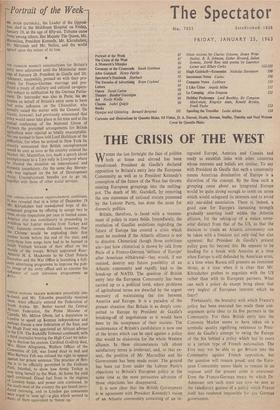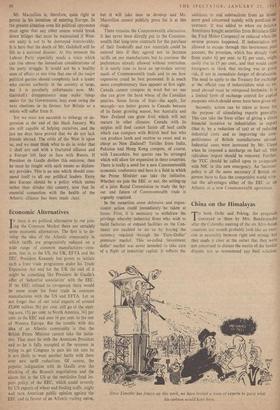THE CRISIS OF THE WEST
WITH IN the last fortnight the face of politics both at home and abroad has been transformed. President de Gaulle's declared opposition to Britain's entry into the European Community as well as to President Kennedy's conception of the future of the West has thrown existing European groupings into the melting- pot. The death of Mr. Gaitskell, by removing the one statesman of national stature possessed by the Labour Party, has done the same for domestic politics.
Britain, therefore, is faced with a reassess- ment of policy in many fields. Immediately, the revelation of Gaullist ambitions regarding the future of Europe has created a crisis which must be resolved if the Atlantic alliance is not to dissolve. Chimerical though those ambitions are—just how chimerical is shown by talk from Paris of a Franco-German 'defence of Europe' after American withdrawal—they would, if not resisted, destroy any future possibility of an Atlantic community and rapidly lead to the break-up of NATO. The question of British entry into the European Community has been carried up to a political level, where problems of agricultural terms are dwarfed by the urgent necessity of maintaining the ties between America and Europe. It is a paradox of the present situation that Britain is as deeply com- mitted to Europe by President de Gaulle's breaking-off of negotiations as it would have been by his acceptance of their success. The maintenance of Britain's candidature is now one of the levers which can be used against a policy that would be disastrous for the whole Western alliance. In these circumstances talk about satisfactory terms is irrelevant, and, to that ex- tent, the position of Mr. Macmillan and his Government has been made easier. The ground has been cut from under the Labour Party's objections to Britain's European policy at the same time as the most persuasive advocate of those objections has disappeared.
It is now clear that the British Government is in agreement with President Kennedy's vision of an Atlantic community consisting of an in- tegrated Europe, America and Canada and ready to establish links with other countries whose interests and beliefs are similar. To say with President de Gaulle that such a community means American domination of Europe is a distortion of the concept. By the time such a grouping came about an integrated Europe would be quite strong enough to insist on terms which would safeguard its interests and to avoid any one-sided association. There is, indeed, a good case for Europe's increasing strength gradually asserting itself within the Atlantic alliance, for the taking-up of a stance some- what distinct from that of the US, so that the decision to create an Atlantic community can be taken with a freedom not only real but also apparent. But President de Gaulle's present policy goes far beyond this. He appears to be heading for a break with America at a time when Europe is still defended by American arms, at a time when Russia still presents an imminent threat, at a time when it is clear that Mr. Khrushchev prefers to negotiate with the US rather than with its European partners. What can such a policy do except bring about that very neglect of European interests which he fears?
Fortunately, the brutality with which France's policy has been executed has made these con- sequences quite clear to its five partners in the Community. For them British entry into the Common Market seems to have taken on a symbolic quality signifying resistance to Presi- dent de Gaulle's attempt to swing the Europe of the Six behind a policy which has its roots in a certain type of French nationalism. The Five may not be able to get Britain into the Community against French opposition, but the question will remain posed, and the Euro- pean Community seems likely to remain in an impasse until the present crisis is overcome. Even the Franco-German treaty by which Dr. Adcnauer sets such store can now be seen as the valedictory gesture of a policy which France itself has rendered impossible for any German government. Mr. Macmillan is, therefore, quite right to persist in his intention of entering Europe. In the present situation even his political opponents must agree that any other course would break down bridges that must be maintained if West- ern unity is not to be destroyed irretrievably. It is here that the death of Mr. Gaitskell will be felt as a national disaster. At this moment the Labour Party especially needs a voice which can rise above the immediate considerations of the party struggle. It would not be a healthy state of affairs at any time that one of the major political parties should completely lack a leader who carries authority in the country at large, but it is peculiarly unfortunate now. Mr. Gaitskell's disappearance may make things easier for the Government, may even swing the next elections in its favour, but Britain as a whole will suffer from it, Yet we must not succumb to lethargy or de- pression at the end of this black January. We are still capable of helping ourselves, and the last ten days have proved that we do not lack friends abroad. The crisis of the West is upon us, and we must think what to do in order that it shall not end with a fractured alliance and a Europe left face to face with Russia. If President de Gaulle desires this outcome, then he must be fought with such means as diplom- acy provides. This is an aim which should com- mend itself to all our political leaders. Entry into Europe should be a policy which unites rather than divides this country, now that its essential connection with the health of the Atlantic alliance has been made clear,



































 Previous page
Previous page